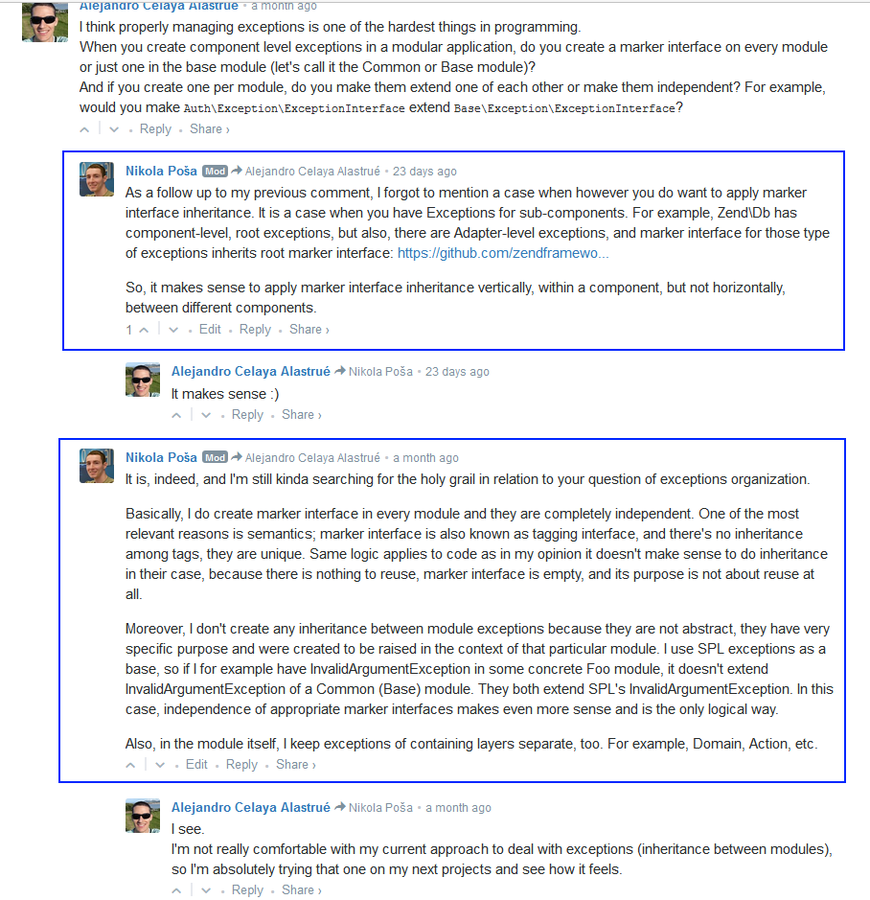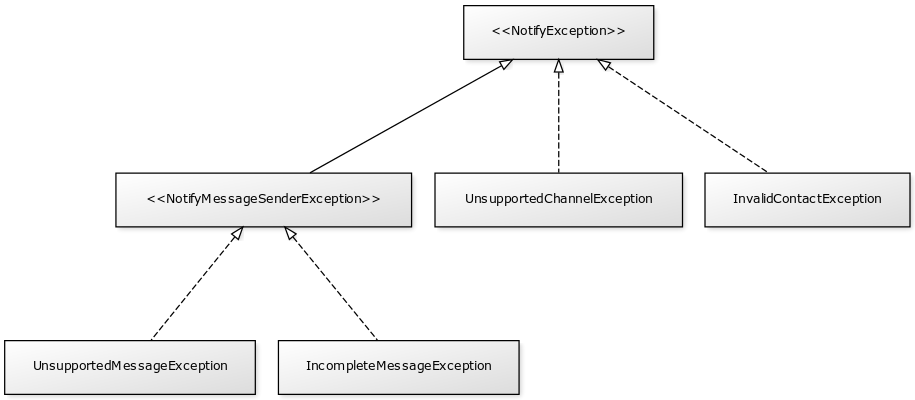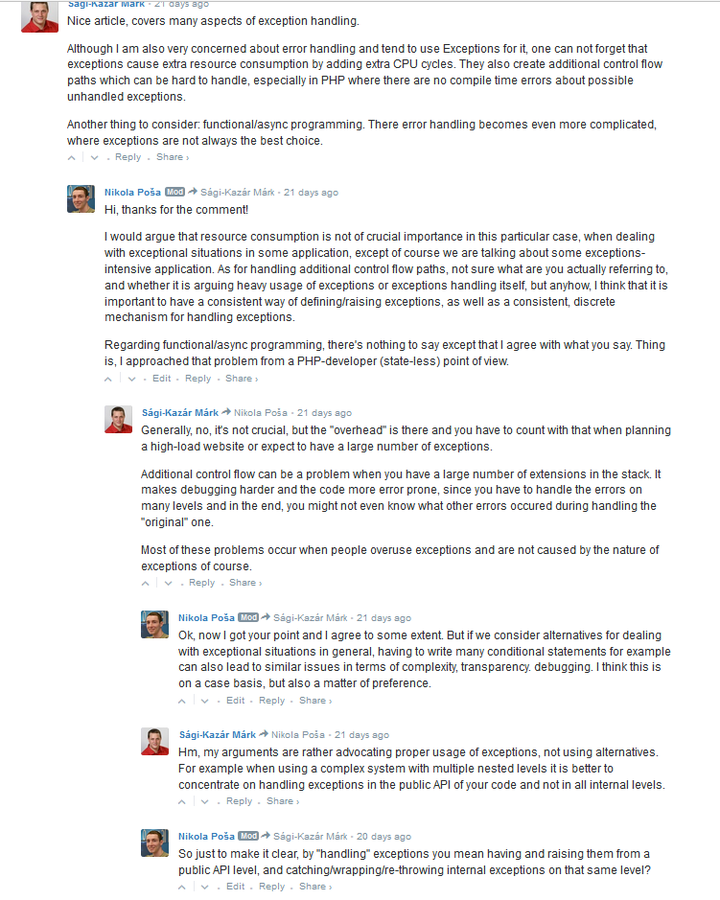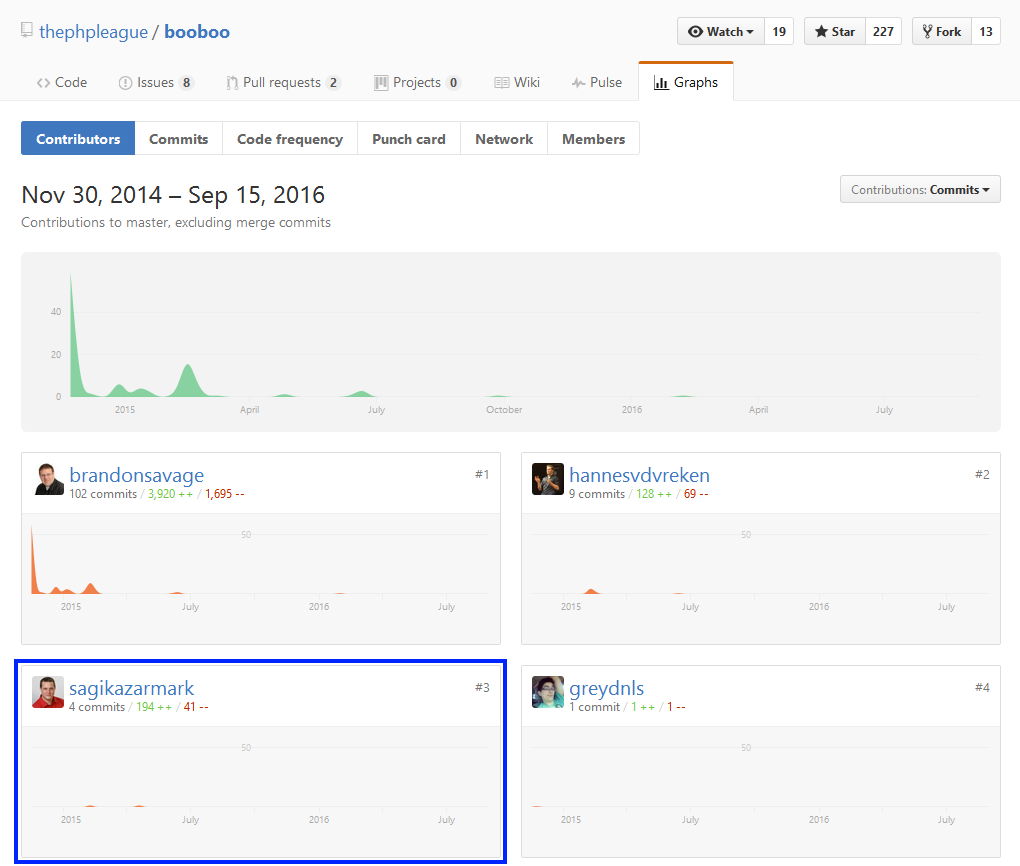Best practices for handling exceptional behavior

Nikola Poša
Web developer & Open-Source Contributor

Normal vs Exceptional flow
- normal flow - one that would be executed in the absence of errors
- exceptional flow - disrupts normal flow after some exceptional condition is met
Do NOT return null
- don't foist callers with problems
- throw an exception
- return Special Case object
Do NOT return null
class ArticleService
{
public function getArticle(string $id)
{
$article = $this->repository->findBy('id', $id).first();
if (!$this->getPermissionsService()->can('read', $article)) {
return null;
}
return $article;
}
}
Do NOT return null
class ArticleService
{
public function getArticle(string $id) : Article
{
$article = $this->repository->findBy('id', $id).first();
if (!$this->getPermissionsService()->can('read', $article)) {
throw new InsufficientPermissionsException();
}
return $article;
}
}throw an exception
Do NOT return null
class ArticleService
{
public function getArticle(string $id)
{
$articles = $this->repository->findBy('id', $id);
if ($articles.isEmpty()) {
return null;
}
$article = $articles.first();
if (!$this->getPermissionsService()->can('read', $article)) {
return null;
}
return $article;
}
}
Do NOT return null
class ArticleService
{
/**
* @param string $id
* @throws ArticleNotFoundException
* @throws InsufficientPermissionsException
* @return Article
*/
public function getArticle(string $id) : Article
{
$articles = $this->repository->findBy('id', $id);
if ($articles.isEmpty()) {
throw new ArticleNotFoundException();
}
$article = $articles.first();
if (!$this->getPermissionsService()->can('read', $article)) {
throw new InsufficientPermissionsException();
}
return $article;
}
}throw an exception
Do NOT return null
return Special Case object
special/custom version of a on object that is returned in a normal flow
public function getArticle(string $id) : Article
{
$articles = $this->repository->findBy('id', $id);
if ($articles.isEmpty()) {
return new NonexistentArticle();
}
$article = $articles.first();
return $article;
}class Article
{
//...
}
class NonexistentArticle extends Article
{
public function getTitle()
{
return 'Not found';
}
public function getContent()
{
return 'Go back to <a href="/">Home Page</a>';
}
}Working with Exceptions
throw new \Exception('Article with the ID: ' . $id . ' does not exist');
Custom Exception classes
- improved readability/expressiveness
- caller can act differently based on Exception type
Custom Exception classes
class ArticleNotFoundException extends RuntimeException
{
}
//...
throw new ArticleNotFoundException('Article with the ID: ' . $id . ' does not exist');Formatting Exception messages
- rellocation of formatting logic
- formatting logic in a place where exceptions are thrown results in distracting and noisy code
- separation of responsibilities
- named constructors
class ArticleNotFoundException extends RuntimeException
{
public static function forId(string $id) : self
{
return new self(sprintf(
'Article with the ID: %s does not exist',
$id
));
}
}
//...
throw ArticleNotFoundException::forId($id);Formatting Exception messages
class InsufficientPermissionsException extends RuntimeException
{
private $entity;
private $privilege;
public static function forEntityAndPrivilege(
EntityInterface $entity,
string $privilege
) : self {
$exception = new self(sprintf(
'You do not have permission to %s %s with the id: %s',
$privilege,
get_class($entity),
$entity->getId()
));
$exception->entity = $entity;
$exception->privilege = $privilege;
return $exception;
}
public function getEntity() : EntityInterface
{
return $this->entity;
}
public function getPrivilege() : string
{
return $this->privilege;
}
}Cohesive Exception classes
- Exception classes must not violate SRP
Cohesive Exception classes
class UserException extends Exception
{
public static function forEmptyEmail() : self
{
return new self("User's email must not be empty");
}
public static function forInvalidEmail(string $email) : self
{
return new self(sprintf(
'%s is not a valid email address',
$email
));
}
public static function forNonexistentUser(string $userId) : self
{
return new self(sprintf(
'User with the ID: %s does not exist',
$userId
));
}
}
Cohesive Exception classes
class InvalidUserException extends DomainException
{
public static function forEmptyEmail() : self
{
return new self("User's email address must not be empty");
}
public static function forInvalidEmail(string $email) : self
{
return new self(sprintf(
'%s is not a valid email address',
$email
));
}
}
class UserNotFoundException extends RuntimeException
{
public static function forUserId(string $userId) : self
{
return new self(sprintf(
'User with the ID: %s does not exist',
$userId
));
}
}Component-level Exceptions
- allows having Exception type that can be caught for any exception that emanates within a component
- good practice in case of library code
- accomplished by applying Marker Interface
Component-level Exceptions
namespace App\Domain\Exception;
interface ExceptionInterface
{
}
class UserNotFoundException extends \RuntimeException impements ExceptionInterface
{
public static function forUserId(string $userId) : self
{
return new self(
sprintf(
'User with the ID: %s does not exist',
$userId
)
);
}
}Component-level Exceptions
use App\DBAL\Exception\ExceptionInterface as DBALException;
use App\Domain\Exception\ExceptionInterface as DomainException;
try {
//some code...
} catch (DBALException $dbalEx) {
//...
} catch (DomainException $domainEx) {
//...
} catch (\Exception $ex) {
//...
}
Component-level Exceptions

Exception codes
- uniquely identifies error that happened
- typically used for APIs
Exception codes
class UserNotFoundException extends RuntimeException
{
public static function forUserId(string $userId) : self
{
return new self(
sprintf(
'User with the ID: %s does not exist',
$userId
),
ErrorCodes::ERROR_USER_NOT_FOUND
);
}
}Error Handling
- Domain layer freely raises exceptions
- Global error handler above your code
- Built-in framework mechanism
- Popular error handling libraries (Whoops, Booboo)
- PHP 7 Error exceptions
Error Handling
use Whoops\Run;
use Whoops\Handler\PrettyPageHandler;
use Whoops\Handler\JsonResponseHandler;
$run = new Run();
$run->pushHandler(new PrettyPageHandler());
if (\Whoops\Util\Misc::isAjaxRequest()) {
$jsonHandler = new JsonResponseHandler();
$run->pushHandler($jsonHandler);
}
$run->register();

Error Handling
